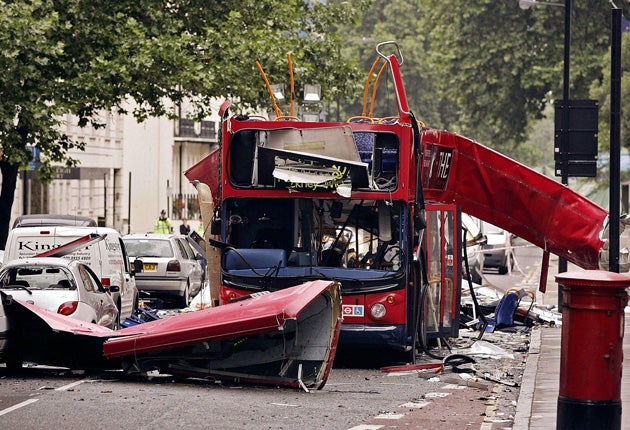May loses fight to keep July 7 evidence secret

Your support helps us to tell the story
From reproductive rights to climate change to Big Tech, The Independent is on the ground when the story is developing. Whether it's investigating the financials of Elon Musk's pro-Trump PAC or producing our latest documentary, 'The A Word', which shines a light on the American women fighting for reproductive rights, we know how important it is to parse out the facts from the messaging.
At such a critical moment in US history, we need reporters on the ground. Your donation allows us to keep sending journalists to speak to both sides of the story.
The Independent is trusted by Americans across the entire political spectrum. And unlike many other quality news outlets, we choose not to lock Americans out of our reporting and analysis with paywalls. We believe quality journalism should be available to everyone, paid for by those who can afford it.
Your support makes all the difference.Home Secretary Theresa May has lost a legal challenge to a coroner's refusal to hold closed sessions of the 7/7 inquests to hear top secret evidence.
Lady Justice Hallett yesterday rejected calls from MI5 and the Home Secretary for the families of victims in the 2005 London attack to be excluded from hearings while she examines highly-sensitive intelligence material.
Lord Justice Maurice Kay and Lord Justice Stanley Burnton upheld the coroner's ruling at the High Court.
They will give their full reasons at a later date. The Government could now attempt to appeal against the decision or use powers to transform part of the inquest into a public inquiry, which could examine the secret documents in closed hearings.
Appeal court judge Lady Justice Hallett concluded that she had powers under Rule 17 of the Coroners Rules 1984 to exclude the public from hearings in the interests of national security.But she ruled that this did not include "interested persons", such as the bereaved relatives, who are legally entitled to be represented. The coroner said the secret documents could be edited to remove names of sources and other confidential information.
"I am still hopeful that, with full cooperation on all sides, most if not all of the relevant material can and will be put before me in such a way that national security is not threatened,"she said in her ruling on November 3.
"Sources' names may be withheld; redactions made. I do not intend to endanger the lives of anyone. I do not intend to allow questions which might do so," she said.
Lawyers for Mrs May and MI5, also known as the Security Service, went to the High Court last week seeking a judicial review of the ruling. They argued that the coroner would not be able to reach accurate conclusions about MI5's involvement in tracking the 7/7 bombers without seeing the secret evidence, which cannot be revealed in open sessions. James Eadie QC said: "This is not an attempt by the Security Service to avoid or to minimise the scrutiny of their actions by the coroner by citing the need to protect national security. The position is entirely to the contrary."
Section 17A of the Coroners Act 1988, as amended in 1999, gives the Lord Chancellor power to adjourn an inquest if the death is being investigated by a public inquiry.
This provision was controversially used in the case of Azelle Rodney, 24, who was shot dead by police in London in 2005, after the inquest into his death stalled over the release of secret evidence. But Mr Eadie said last week there were "serious potential practical problems"with going down this route.
The inquests into the deaths of the 52 innocent people murdered in the 2005 attacks in London are examining alleged failings by police and MI5.
Bereaved families want to ask intelligence officials why they did not follow up plot ringleader Mohammed Sidique Khan and his right-hand man, Shehzad Tanweer, after surveillance officers watched them meeting known terror suspects 17 months before the bombings. MI5 argues this is both unnecessary and impossible because doing so would require the disclosure of top secret files
Join our commenting forum
Join thought-provoking conversations, follow other Independent readers and see their replies
Comments